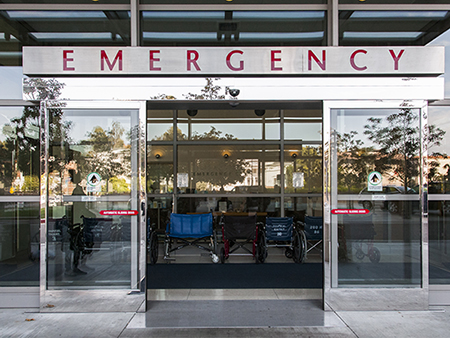Editor's Note: The information published in this story is accurate at the time of publication. Always refer to uab.edu/uabunited for UAB's current guidelines and recommendations relating to COVID-19.
 Call your healthcare provider if you think you have COVID-19 symptoms before you go to your doctor’s office or the emergency room.You wake up with a sore throat or a cough and may immediately think the worst — what if I have the novel coronavirus? Before you do anything, take a deep breath. Keep in mind that it is still flu and cold season in the United States, and seasonal allergies are beginning, too.
Call your healthcare provider if you think you have COVID-19 symptoms before you go to your doctor’s office or the emergency room.You wake up with a sore throat or a cough and may immediately think the worst — what if I have the novel coronavirus? Before you do anything, take a deep breath. Keep in mind that it is still flu and cold season in the United States, and seasonal allergies are beginning, too.
Then remember the most important guideline you can follow: Call your doctor first, and do not go to the doctor’s office or the emergency department without being told to do so by your health care provider.
Call your doctor before you go to the doctor’s office or hospital
The novel coronavirus is highly contagious, and health care providers are trying to protect themselves and their other patients from infection. Primary symptoms of COVID-19 include fever, runny nose, dry cough, shortness of breath, fatigue and body aches. Severe symptoms include a fever of 100.4 degrees Fahrenheit or higher and pneumonia.
“We need to keep COVID-19 out of the doctor’s office and hospital — not bring in potential cases that could infect others, especially those who are most vulnerable,” said Irfan Asif, M.D., the chair of the Department of Family and Community Medicine at the University of Alabama at Birmingham. “If you think you may have it, call your doctor’s office first.”
If you have a scheduled appointment soon, call your doctor’s office to report any symptoms and recent travel. If you are in need of care that is not related to COVID-19 symptoms, talk to your doctor and see if you can be treated over the phone.
| Get the latest COVID-19 information at uab.edu/coronavirus. |
“We do not want people who are well to come into contact with and be exposed to people who are sick,” said William Curry, M.D., associate dean for Primary Care and Rural Medicine at UAB. “By calling first, we will be able to determine if we can diagnose you without exposing you to other illnesses that you may come in contact with at the hospital or doctor’s office.”
Your doctor will assess your symptoms by phone, get your travel history and listen to your concerns. The majority of cases are mild, and you will likely be told to self-quarantine at home.
People who do not have a health care provider should call their state or local health department. To contact the Alabama Department of Public Health, call 1-888-264-2256.
Avoid the emergency room
Do not call or walk into an emergency department if you think you may have COVID-19. Emergency rooms are overwhelmed with requests for tests by patients who have mild symptoms, which may or may not be related to the novel coronavirus. If you have symptoms, contact your doctor first and let your health care provider instruct you on what to do.
“Unless you are seriously ill and require emergency care, do not go to the emergency department,” said Erik Hess, M.D., a professor in the Department of Emergency Medicine at UAB. “We need to focus our efforts on providing care for those who are critically ill, not people who are seeking testing for COVID-19 who have mild symptoms.”
Those who should consider going to the emergency room or calling 911 are people who have worsening shortness of breath, such as not being able to finish a sentence without taking a breath. Older people with underlying conditions and those who are immunocompromised should also consider immediate care.
Patients at UAB can either call their providers or utilize the Patient Portal to message their physicians. UAB eMedicine is another resource and will provide patients with diagnoses and treatment plans that have been reviewed by doctors online. UAB patients also have the option of consulting their physician by telemedicine — either telephone or virtual visit by computer or smartphone. Contact your physician practice for more details.
For more information about COVID-19, visit www.uab.edu/coronavirus.